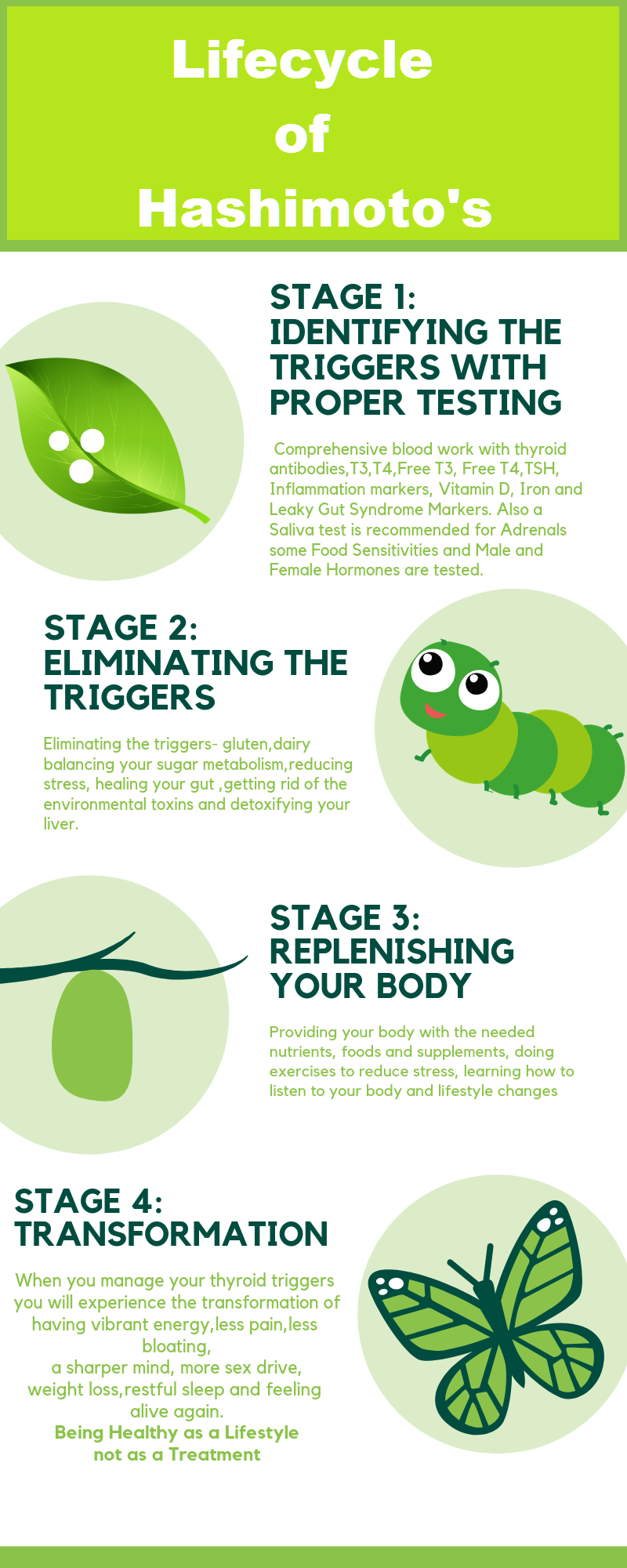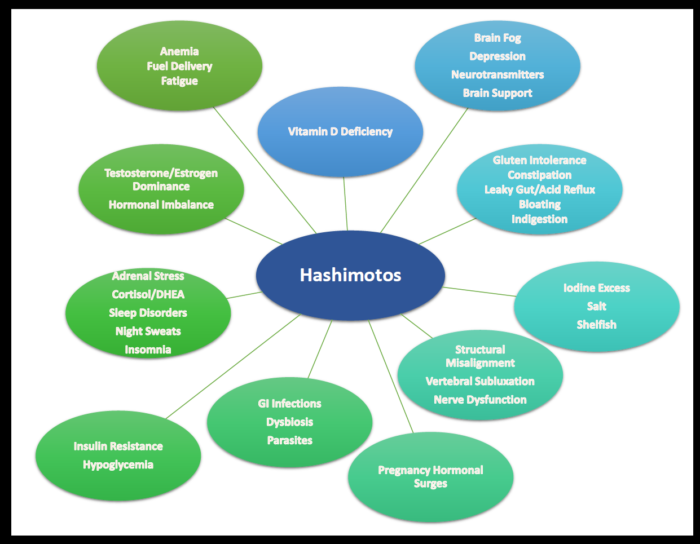Simply stated, Hashimoto’s is an auto-immune condition that attacks and destroys the thyroid gland.
ASK A QUESTION
MAKE AN APPOINTMENT
Dr. Michael Gorgas is a Thyroid & Hashimoto’s specialist in San Diego, California. In his Oceanside, CA office, he treats chiropractic and thyroid patients. His passion for the “whole-human” approach to care, allows him to get to the underlying causes of symptoms that keep you from being, and doing, what you want to.
It may occur in any age group of men and women, and it is usually triggered during times of hormonal changes such as puberty, pregnancy, and perimenopause.

Lifecycle of Hashimoto’s Infographic
Severe and prolonged stress and life altering events such as:
- losing a job,
- losing a loved one or a pet,
- moving residences,
- changing jobs, or
- getting married or divorced.
All of these are major inflammatory stressful events that wreak havoc on our immune system and can trigger an auto-immune response such as Hashimoto’s.
The trouble with the standard medical model is that Hashimoto’s is treated as a thyroid condition and the immune system, which is at the central core of the condition, is seldom considered. So, the proper labs are seldom ordered. Meanwhile, the condition goes undiagnosed, or is commonly diagnosed as Hypothyroidism, with a thyroid replacement hormone prescribed; such as Synthroid, Lovothyroxine, or Naturethroid.
These thyroid replacement hormone meds can offer temporary relief from symptoms, typically within a few months the symptoms return. When symptoms return, dosing adjustments or medication changes occur with very little relief of the symptoms. The condition may cause more and different meds to be prescribed because the symptoms of Hashimoto’s tend to mimic the symptoms of a myriad of many conditions.
We provide top quality chiropractic and thyroid care at our Oceanside, California location
Symptoms of Hashimoto’s:
- Weight gain
- Fatigue
- Dry skin
- Increased sensitivity to cold
- Memory problems, Brain fog
- Constipation
- Depression and/or anxiety
- Dry, thinning/falling hair
- Low libido or sexual dysfunction
- Heavy and irregular menstruation
- Enlarged thyroid or goiter
- Pale skin, puffy face
- Problems with fertility
- High cholesterol
- Muscles aches and tenderness
- Swelling of the points; painful joints
- Frequent infections, colds, and illnesses due to low immune function
- Frequent urination and thirst
- Digestive issues like bloating, constipation, or loose stools
- Insomnia; getting to and staying asleep
- Afternoon headaches
I’ve been diagnosed with Hypothyroidism
Hypothyroid or low thyroid function is diagnosed by checking the TSH (thyroid stimulating hormone) in your blood. This is the most commonly diagnosed thyroid condition and is primarily diagnosed with TSH levels above 3.0.
Elevated levels of TSH in the blood can produce many of the thyroid related symptoms such a weight gain, hair loss, and fatigue. When you’re suffering multiple symptoms of hypothyroid and your doctor declares that “your labs are normal”, you may feel like you’re going crazy. No! You are not crazy! You just haven’t had the proper labs ordered or been accurately diagnosed.
What’s the difference between Hyper and Hypothyroidism?
This is a great question that often goes unanswered. It all goes back to the TSH levels. If you have high TSH, above 3.0, then you are diagnosed with HYPOthyroid.
Common symptoms of hypothyroid are:
- fatigue
- weight gain
- constipation
- morning headaches
- cold hands and feet
- lack of motivation
- depression
On the other hand, if you have low TSH levels, below 1.8, then you are diagnosed as HYPERthyroid.
Common symptoms of hyperthyroid are:
- loss of appetite
- weight loss
- feeling anxious and nervous
- insomnia

ASK A QUESTION
Now, the thing about Hashimoto’s is that it can show up with symptoms of both hypo and hyper thyroid. This is the result of the inflammation caused by the immune attacks to and the destruction of the thyroid gland. In these cases, you may experience symptoms of both high and low TSH levels as well as other symptoms such as muscle aches, joint pain, headaches, night sweats, brain fog, mood swings, low sex drive, hair loss and lose stools. Therefore, the proper lab test must be ordered from the very start to include the other thyroid hormones and the antibodies. This is the only way to arrive at an accurate diagnosis of your condition.
MAKE AN APPOINTMENT
Thyroid Hormones
The little, butterfly shaped, thyroid gland sits at the base of your throat. It is what controls your metabolism. It also secretes several other hormones beyond TSH. Your thyroid also produces a hormone called T4 (Thyroxine) which your body converts into T3 (Triiodothyronine) and then to TSH. There are also other aspects of those hormones such as T3 Uptake, Free T3 and Free T4, that provide additional information for accurately diagnosing your thyroid condition. Unfortunately, these markers are seldom checked for in routine Thyroid Lab Panel as ordered by most physicians.
Thyroid Antibodies
To rule out auto-immune thyroid Hashimoto’s, additional tests must be ordered. These includes the thyroid Antibodies for Hashimoto’s such as the TPO-Ab (Thyroid Peroxidase Antibody), and the TAA-Ab antibodies (Thyroglobulin Antibody). If one, or both, come back high in your labs, will confirm a definitive diagnosis for Hashimoto’s.
Infrequently, a person may have a secondary auto-immune condition called Graves Disease, which shows up as Hyperthyroid with very low TSH levels. This condition is diagnosed by checking another Thyroid Antibody called TSI (Thyroid stimulating immunoglobulin). In rare occasions a patient may have both Hashimoto’s and Graves Disease at the same time.
We leave no stone unturned when diagnosing and treating with your thyroid condition. We order all the thyroid lab markers right from the start so that we can get right to the underlying causes of your condition and get you feeling better again, fast.
Our Full Thyroid panels include the following:
TSH, T4, T3, Free T3, Free T4, T3 Uptake, TSI, TPO-Ab, TAA-Ab
What else do we check?
Recognizing that Hashimoto’s an auto immune condition that affects many metabolic and hormonal functions, we place special emphasis on many of the triggers to the immune system. These triggers may include:
- Hormonal imbalances
- Blood sugar imbalances
- Leaky gut syndrome
- Nutritional deficiencies
- Food intolerance like gluten
- Prior head trauma
- Stress
- Adrenal Fatigue
- Inflammation
Hormone Panels
We check hormone panels to determine if the patient suffers from low testosterone in males or low estrogen/progesterone levels in females. This is a salivary test. We evaluate your saliva instead of your blood. This method proves to be more accurate in analyzing hormones and food intolerances. Symptoms related to decreased hormone levels may include depression, mental fogginess, fatigue, mood swings, hot flashes, sweating attacks, weight gain, and decreased physical stamina.
Adrenal Stress Index
We further test your adrenal glands with a test called an Adrenal Stress Index. This is also a salivary test. Your adrenals glands are your “stress” organs; meaning that they react to stress. If you have been or are currently under stress, this test is a must.
Food Sensitivity Panel
In today’s world of GMO foods and toxic chemicals, it is important to check for food sensitivity. Our test determines if you have sensitivity to gluten, milk, eggs, dairy, yeast and soy (Dr Gorgas will determine which ones to ask you for).
Blood Sugar Imbalances
Diabetes and insulin resistance are blood sugar related conditions associated with weight gain and sluggish metabolism. They are frequently monitored and checked in routine lab work. An often-overlooked blood sugar marker is that of low blood sugar or HYPOglycemia. This condition is usually the root cause of anxiety and panic attacks. Hypoglycemia and insulin resistance can often occur together causing a myriad of symptoms that are often misdiagnosed. We pay special attention to blood sugar metabolism, whether high or low, because it plays such a key role in your overall health, especially in managing Hashimoto’s.
Leaky Gut Syndrome
Leaky Gut Syndrome, AKA, intestinal permeability, is a major inflammatory trigger which is very closely associated with thyroid problems. Due to stress, alcohol consumption, antibiotic use, and poor diet, (just to mention a few causes) little microscopic openings occur in the lining of our intestines. These little openings allow for undigested food, bacteria, chemicals, and the like to go directly into our bloodstream causing inflammation that shows up as bloating, poor digestion, acid reflex, loose stools, and constipation. It is also a central cause of food intolerance’s and allergies. It is also closely related to micro nutrient deficiencies. Since there is no direct test for leaky gut syndrome (LGS), it requires the proper interpretation of your labs to determine its presence. We run an extensive metabolic panel to determine if you are suffering from LGS.
Previous Head Trauma
There is a huge correlation at our institute between previous head trauma and auto-immune thyroid. Whether it was a childhood injury forty years ago or a recent car accident, the condition may trigger the onset of Hashimoto’s. Dr. Gorgas prides himself in performing the proper in-depth neurological and digital X-ray evaluation to determine if your injury is related to your symptoms; once again, doing a complete workup to determine the underlying causes of your condition.
Schedule an Appointment
To schedule simply complete the form with your full name, email address, and best contact phone number.
Our friendly staff will promptly call you back, at your convenience, to schedule your consultation and case review, so you can get on the track to regaining your health.
If your request is received outside of regular office hours, we will call the next day our office is open. Your scheduling request is time stamped, so rest assured that you will be given first opportunity for the next available appointment.
